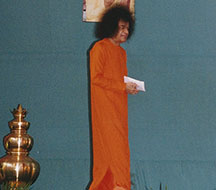
How religions arisened in the world
Puttaparthi, Prasanthi Nilayam (Dasara )
Description
Embodiments of the sacred Atma!! Bharath from times immemorial has taught the world the ways to attain everlasting peace by spreading the spiritual teachings and ideology. It is the Hindu culture that has given the world the sacred ideology in the prayer, “Lokasamastha sukhinobhavanthu! May all be happy and peaceful!!” The ancient sages, kings and women of great character of this land have protected and fostered this ideology from times immemorial. In the more recent times, influenced by the changes in the times and conditions in the country, the Vedic rituals have been misinterpreted, the sacred hymns and the godly beings depicted in the Vedas have been given distorted interpretations and images and based on the distorted versions new religions have been created and brought into practice. Many different sects of religions under different names like: ‘gaanapathya’, ‘saakteya’, ‘veerasaiva’, ‘ chakravaaka’ and ‘saura’ have come into being based on different interpretations. These religions, which have a chosen deity worshipped in a certain manner, have come to be known by the name of the same. These religions stress the rituals in worshipping the deity and have long propagated the same. It is imperative to realise the truth that the traditions have been fostered with an aim to improve the character of a person and not for propagating it under the garb of superstitions to further individual selfish motives. The end and aim of all these aspects is to bring out the truth that morality and spirituality are the quintessence of all religions.
Topics
-Religion
-
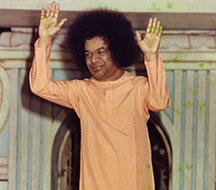
Myths about christmas and christianity
00:01:47Today is a Christmas holiday. How did you get this word Christmas? This is a Roman word. Christmas doesn't actually fall in the month of December. Just because it is the cold season and as it is not possible to move around, people want to stay back at home and do household work; hence they have chosen December for celebrating Christmas. In fact, it is in March that Christ was born. The authors of books have changed the month altogether. Louis was an author from Germany and he has written just the opposite. As heads vary, so also thoughts vary. People went on writing as they liked. There are some who wrote that Jesus was never born! There are some who have written that it was the brother of Jesus who was crucified and not Jesus. Some have written that Jesus was in Japan when his brother was crucified. All this is imagination. Jesus is truth - he is one who experienced it all.
-
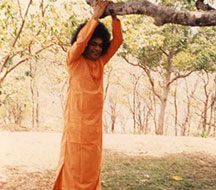
Inner significance of Christian Cross
00:02:18Some of the Christians show this sign (gesturing the sign of the cross). This indicates these four - the head, heart and the hands. We have to take these three as the basis - the head, heart and the hand. Install God in your heart, think of God by your head, work with your hands, that is the meaning of these indications. So, in the cross, the three - the head, heart and hands (are indicated). Some think it only indicates the cross. That is not the true inner meaning of the cross. The head, the heart and the hands, let all these three grow along the sacred path. Whatever you may undertake, take it as God's work. Whatever thought may be entertained, let it be divine. Let any work be done, take it as God's work. This is what is meant when they do like that (making the sign of the cross). Some don't understand the meaning - they waste their hands, misuse their heads, and pollute their hearts. Heart is the altar of God, and head is the reflection of the divine. It is all reaction, reflection and resound of God in our heart. With these feelings we have to pass on and share this message of God in society.
-

Religions are many God is one: Analogy of a Veena
00:02:42One need not criticise any religion. Swami tells a small example so that the students may understand better. The stringed instrument, Veena, has many strings that each give out a different sound. When strings are out of sync it is harsh on the ears. Though the strings are many and different the instrument Veena is one. When all the strings are struck in harmony, it gives out melodious music. The whole country can be likened to a Veena and all the religions to its strings. When all the religions are strung together in harmony it leads to happiness. One must have firm faith in this principle. The Sai Baba of Shirdi used to ask for two rupees from the devotees. The two rupees stand for ‘Shraddha’, steadfastness and ‘Bhakthi’ devotion. He used to ask for those two from the devotees. These two are like the two cotyledons of the same seed. The plant emerges only when both the cotyledons are present and not when they are separate. Therefore steadfastness and devotion must conjoin like the cotyledons of the seed to produce the sapling of happiness and bliss. Hence one should not foster any differences based on religion. “Matamulanniyu veru margambu okkate!! Vastra bhedamu veru vasthuvokkate!! Srungaaramulu veru bangaaramokkate!! Pasula vannelu veru paalu okkate!! Jeeva janthulu veru jeevundu okkade!! Poolajathulu veru pooja okkati!! Telivilekan maanavulu telivi tappi, Bathuku kosam bahu baadha badhdhulairi!!” Religions may be many but the path is one! Clothes may be different but yarn is same! Ornaments may be different but gold is one! The colours of cows may vary but milk is same! Creatures may be many but the in dweller is one! Flowers are many but worship is one! Lacking intelligence and being foolish, Man is bound and chained to carry a living!!
-
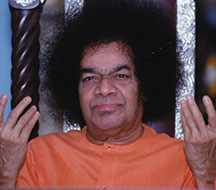
Essence all religions is the religion of Sathya Sai
00:01:11When one fosters the idea that people of all religions are necessarily the descendants of God, then there would be no room for individual hatred and jealousy. All the members of the Sathya Sai organizations must enthusiastically, courageously and with strong determination state that the religion of Sathya Sai is the essence of all the religions.
-
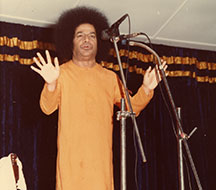
Religions are created by minds
00:00:46All said and done, one can realise that it is due the different mindset that the different religions have sprouted. It is clear that the mind is a conglomeration of desires. Thus the aspect of mind which has been spoken about for the past eight days is also the basis in this context too.
-
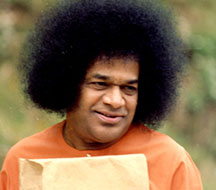
All religions taught to be good
00:02:19Every religion has been teaching and stressing the importance of devotion and wisdom and have upheld worship as an essential means to the end. Religions were named after its founder. The essence of all religions is the religion of Sai. The inner meaning, the essence, the destination, the intricacies of every religion is one and the same. No religion teaches one to cause strife or speak lies or harm others. All religions teach only the good, Know this and conduct with wisdom, If minds are pure, how can any religion be bad? Heed the words O sons of Bharath!!
-
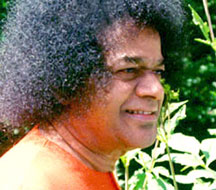
Teachings of Zoroastra; Religion of Parsi
00:02:18Zoroastrian is the founder of the religion followed by Parsees and its followers are called as Zoroastrians. In this religion it is believed that all the bad thoughts and intentions should be burned and sacrificed in the fire of wisdom. Importance has been given to fire which depicts the flame of knowledge that is ever burning in one’s heart and spreading the light of wisdom. Every cell, atom and being born in this world must perish. The human body too is destined to perish someday or the other. Fire is the entity that reduces everything into ashes. Ash also turns into ash when once it is put in fire. The inner meaning of this religious thought is that the fire of wisdom will ultimately reduce all the worldly and material desires into ashes.
-
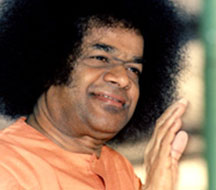
Religions and their practices are different; But God is one
00:04:13Though from ancient times the Hindu philosophy has been fostered and protected by Hindus, unfortunately with the changing times the ideas about oneness have gradually shifted into dualism and thus religions with different ideologies have sprouted viz., Vaishanvism and Saivism. When there are sub sects and sub divisions in the religions of recent origin there is nothing surprising in sub sects and divisions sprouting in an ancient religion like the Hindu culture. Even in the religion of Muslims, one finds two sects namely Shias and Sunnis. In Christianity too one finds the sub sects of Catholics and Protestants. Though there was a split in the main ideology leading to the formation of different sub sects in all the above religions, none denied the existence of God or Christ or Allah or Eshwara. Different words are used by different sects to denote the different notions but essentially a common base is accepted and worshipped. What one calls as ‘Eshwara’ or ‘Bhagwan’ is called as ‘Allah’ by a Muslim. A prayer for Hindu is ‘Namaz’ for Muslim. A pundit for Hindu is a ‘Khazee’ for a Muslim. What is ‘shastra’ or scripture for Hindu, is ‘Mullah’ for a Muslim. The Vedas are the authority for Hindus and for the Muslims it’s the Quran. All said and done, one must realise the truth that the quintessence of all the religions is love. Many religious leaders recognising this truth have preached the oneness of humanity and have propagated that by recognising this common feature man can attain divinity.
-
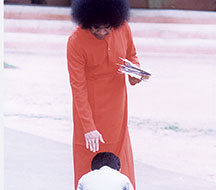
Religions are never the reason for chaos and confusion
00:02:22Embodiments of pavitra atma, Religion and sect is not responsible for the strife and the chaos. It is the individual’s ego, jealousy and selfish motive under the garb of religion that is responsible for the confusion, strife and chaos. Attempts are being made to eradicate religion and faith by the selfish, egoistic people with bad thoughts. Today one’s efforts must be in the direction of eradicating the hatred arising in the name of religion but not to eradicate religion. There is only one caste and that is the caste of humanity. There exists only one religion and that is the religion of love! Love should be the basis of religion. There is no need to attempt to change others into one’s religion or one changing into another religion. One must strive to realise the truth that the essence of all religion and sects is one and the same.
-
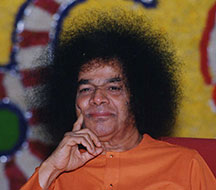
Religions are meant to mend the mind
00:01:39The broad ideology that religion is for mending the mind is absent in today’s man. The essence, the destination, the true content of all religions is to purify one’s mind. The religion which was intended to establish the sacred essence of purification of one’s mind has been abused and misused, wrongly interpreted leading to selfishness and chaos. There are yet others who create the delusion that it is the religion that is the root cause for the prevailing strife and chaos.
-
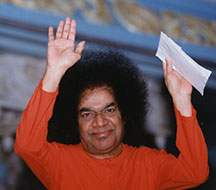
No one is following religion truly
00:02:55Different religions have some differences and some different ideas about the unknow-able God, but they have not differed in essence about things which can be understood and practiced with some effort, such as speaking the truth and doing the good. Today, whatever has been taught in the name of religion and truth, has been forgotten. Things which have not been taught by traditions and in our scriptures are occupying the minds of people, and they are giving them prominence. It is clear that we have no faith in these religions because we are forgetting what the religions have taught us as their essence. We are paying heed to things which do not have religious thought as their basis. It is only when we have complete faith in what has been given as the injunction for man’s conduct by various religions and put it into practice that we would be described as proper followers of these religions. On the other hand, if we only talk about what has been told to us in various religions and the Sastras and do not put this knowledge into practice, we would be described as persons who have no faith in the injunctions given by the religions.
-

All religions taught us to be good
00:05:10Young students! Indian culture is based on non-dual thought and non-dual philosophy. This special feature of Indian philosophy is known to many people. There are differences between the other philosophies of the world and the Adwaitha or non-dual philosophy, which is prevalent in this country. In most western religions, importance is given to the body, mind and intelligence. Amongst these, intelligence is regarded as the highest human faculty, representing man’s self or Atma. This is the angle from which western religion looks at various aspects of life. Indian thought, on the other hand, considers body, mind and intellect as distinct and additional to one’s own Chitta (mind) and Antahkarana (inner consciousness) or the inner heart. Indian culture gives importance to co-ordinating the Atma itself with the highest notion of the Paramatma recognising the oneness thereof in the ultimate analysis. This is the angle from which Indian religion looks at various aspects of life. However, even in India, many religions have come up, flourished and thereby made an attempt at co-ordinating these things with the self or the Atma. All the religions that have come up in this country have given the injunctions that one should speak the truth, that one should not indulge in intrigue, that one should respect one’s mother and father and that one should respect his teacher. No religion of this country has ever told anyone not to give respect to the teacher and not care for the mother and father. All religions have always asked the people to keep away from intrigue. They have never taught us to speak falsehood.
-
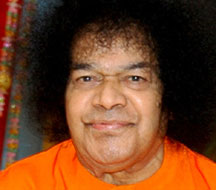
All religions say,
00:01:00All religions, in essence, preach that you should purify your mind and know your own self. We should not try to differentiate one religion from another nor one caste from another. The end and aim of all religions and all castes is one and the same. We should try to realise the oneness of all and the essential truth in them.
Topics
- Analogies
- Atma
- Attachment
- Balvikas
- Bhaja Govindam
- Bhajans
- Body
- Character
- Company
- Compassion
- Culture
- Day to day
- Desire
- Devotees
- Devotion
- Dharma
- Discipline
- Discrimination
- Doctors
- Education
- Faith
- Festivals
- Forbearance
- Gayathri
- God
- Gratitude
- Guru
- Health and healthcare
- HIS Life
- Human values
- India
- Karma
- Love
- Mahabharata
- Man
- Meditation
- Mind
- Music
- Musicians
- Namasmarana
- Nature
- Parents
- Philosophical concepts
- Pleasure and Pain
- Practice
- Ramayana
- Sacrifice
- Sadhana
- Sai Organization
- Saints
- Sathya
- Science
- Senses
- Service
- Sevadal
- Shanthi
- Shirdi Baba
- Society
- Spirituality
- Students
- Thoughts
- Time
- Unity
- Upanishad
- Vedas
- Vices
- Yoga
- Youth
